Application of Microbial-Induced Calcium Carbonate Precipitation in Wave Erosion Protection of the Sandy Slope: An Experimental Study
Abstract
:1. Introduction
2. Materials and Methods
2.1. Materials
2.2. Experiment Set-Up
2.3. MICP Treatment Method
2.4. Penetration Resistance Test
2.5. Calcium Carbonate Content Test
2.6. SEM Analyses
3. Results and Discussion
3.1. Erosion Characteristics of the MICP-Treated Area
3.2. Penetration Resistance and Calcium Carbonate Content
3.2.1. Penetration Resistance
3.2.2. Calcium Carbonate Content
3.3. Microstructures of MICP-treated Sand Particles
3.4. Wave Shape and Excess Pore Water Pressure
3.4.1. Wave Shape
3.4.2. Excess Pore Water Pressure
4. Conclusions
Author Contributions
Funding
Institutional Review Board Statement
Informed Consent Statement
Data Availability Statement
Conflicts of Interest
References
- Cowen, E.A.; Mei, S.I.; Liu, P.L.F.; Raubenheimer, B. Particle image velocimetry measurements within a laboratory-generated swash zone. J. Eng. Mech. 2003, 129, 1119–1129. [Google Scholar] [CrossRef]
- Loukogeorgaki, E.; Angelides, D.C. Stiffness of mooring lines and performance of floating breakwater in three dimensions. Appl Ocean Res. 2005, 27, 187–208. [Google Scholar] [CrossRef]
- Anfuso, G.; Postacchini, M.; Di Luccio, D.; Benassai, G. Coastal sensitivity/vulnerability characterization and adaptation strategies: A review. J. Mar. Sci. Eng. 2021, 9, 72. [Google Scholar] [CrossRef]
- Castelle, B.; Marieu, V.; Bujan, S.; Splinter, K.D.; Robinet, A.; Sénéchal, N.; Ferreira, S. Impact of the winter 2013-2014 series of severe Western Europe storms on a double-barred sandy coast: Beach and dune erosion and megacusp embayments. Geomorphology 2015, 238, 135–148. [Google Scholar] [CrossRef]
- Barnard, P.L.; Short, A.D.; Harley, M.D.; Splinter, K.D.; Vitousek, S.; Turner, I.L.; Allan, J.; Banno, M.; Bryan, K.R.; Doria, A.; et al. Coastal vulnerability across the Pacific dominated by El Niño/Southern Oscillation. Nat. Geosci. 2015, 8, 801–807. [Google Scholar] [CrossRef]
- Gao, X.; Guo, Y.; Shan, W. Beholding the shallow water waves near an ocean beach or in a lake via a Boussinesq-Burgers system. Chaos Solitons Fractals 2021, 147, 110875. [Google Scholar] [CrossRef]
- Gong, W.P.; Tang, H.M.; Wang, H.; Wang, X.R.; Juang, C.H. Probabilistic analysis and design of stabilizing piles in slope considering stratigraphic uncertainty. Eng. Geol. 2019, 259, 105162. [Google Scholar] [CrossRef]
- Mentaschi, L.; Vousdoukas, M.I.; Pekel, J.; Voukouvalas, E.; Feyen, L. Global long-term observations of coastal erosion and accretion. Sci. Rep. UK 2018, 8, 12876. [Google Scholar] [CrossRef] [Green Version]
- Li, M.; Zhang, M.; Du, C.C.; Chen, Y. Study on the spatial spillover effects of cement production on air pollution in China. Sci. Total Environ. 2020, 748, 141421. [Google Scholar] [CrossRef]
- York, I.N.; Europe, I. Concrete needs to lose its colossal carbon footprint. Nature 2021, 597, 593–594. [Google Scholar]
- Ivanov, V.; Chu, J. Applications of microorganisms to geotechnical engineering for bioclogging and biocementation of soil in situ. Rev. Environ. Sci. Bio. Technol. 2008, 7, 139–153. [Google Scholar] [CrossRef]
- Fujii, T.; Raffaelli, D. Sea-level rise, expected environmental changes, and responses of intertidal benthic macrofauna in the Humber estuary. UK. Mar. Ecol. Prog. Ser. 2008, 371, 23–35. [Google Scholar] [CrossRef]
- Gao, F.; Han, X.; Cao, J.; Sha, Y.; Cui, J. Submarine pipeline lateral instability on a sloping sandy seabed. Ocean Eng. 2012, 50, 44–52. [Google Scholar] [CrossRef] [Green Version]
- Amin, M.; Zomorodian, S.M.A.; O’Kelly, B.C. Reducing the hydraulic erosion of sand using microbial-induced carbonate precipitation. Proc. Inst. Civ. Eng. Ground Improv. 2017, 170, 112–122. [Google Scholar] [CrossRef]
- Miao, L.; Wu, L.; Sun, X.; Li, X.; Zhang, J. Method for solidifying desert sands with enzyme-catalysed mineralization. Land Degrad Dev. 2020, 31, 1317–1324. [Google Scholar] [CrossRef]
- Liu, B.; Zhu, C.; Tang, C.; Xie, Y.; Yin, L.; Cheng, Q.; Shi, B. Bio-remediation of desiccation cracking in clayey soils through microbially induced calcite precipitation (MICP). Eng. Geol. 2020, 264, 105389. [Google Scholar] [CrossRef]
- Wu, C.Z.; Chu, J. Biogrouting method for stronger bond strength for aggregates. J. Geotech. Geoenviron. Eng. 2020, 146, 06020021. [Google Scholar] [CrossRef]
- Gomez, M.G.; Dejong, J.T.; Anderson, C.M. Effect of bio-cementation on geophysical and cone penetration measurements in sands. Can. Geotech. J. 2018, 55, 1632–1646. [Google Scholar] [CrossRef]
- Wang, Z.; Zhang, N.; Jin, Y.; Li, Q.; Xu, J. Application of microbially induced calcium carbonate precipitation (MICP) in sand embankments for scouring/erosion control. Mar. Georesour. Geotechnol. 2021, 39, 1459–1471. [Google Scholar] [CrossRef]
- Ma, L.; Pang, A.P.; Luo, Y.; Lu, X.; Lin, F. Benefificial factors for biomineralization by ureolytic bacterium Sporosarcina pasteurii. Microb. Cell Fact. 2020, 19, 12. [Google Scholar] [CrossRef]
- Qabany, A.; Soga, K.; Santamarina, C. Factors affecting effificiency of microbially induced calcite precipitation. J. Geotech. Geoenviron. Eng. 2012, 138, 992–1001. [Google Scholar] [CrossRef]
- Dejong, J.T.; Soga, K.; Kavazanjian, E.; Burns, S.; van Paassen, L.A.; al Qabany, A.; Aydilek, A.; Bang, S.S.; Burbank, M.; Caslake, L.F.; et al. Biogeochemical processes and geotechnical applications: Progress, opportunities and challenges. Géotechnique 2013, 63, 287–301. [Google Scholar] [CrossRef] [Green Version]
- Li, Y.J.; Guo, Z.; Wang, L.Z.; Ye, Z.; Shen, C.F.; Zhou, W.J. Interface shear behavior between MICP-treated calcareous sand and steel. J. Mater. Civ. Eng. 2021, 33, 04020455. [Google Scholar] [CrossRef]
- Meng, H.; Gao, Y.; He, J.; Qi, Y.; Hang, L. Microbially induced carbonate precipitation for wind erosion control of desert soil: Field-scale tests. Geoderma 2021, 383, 114723. [Google Scholar] [CrossRef]
- DeJong, J.T.; Fritzges, M.B.; Nuesselein, K. Microbially induced cementation to control sand response to undrained shear. J. Geotech. Geoenviron. 2006, 132, 1381–1392. [Google Scholar] [CrossRef]
- De Muynck, W.; De Belie, N.; Verstraete, W. Microbial carbonate precipitation in construction materials: A review. Ecol. Eng. 2010, 36, 118–136. [Google Scholar] [CrossRef]
- Chu, J.; Ivanov, V.; Naeimi, M.; Stabnikov, V.; Liu, H. Optimization of calcium-based bioclogging and biocementation of sand. Acta Geotech. 2014, 9, 277–285. [Google Scholar] [CrossRef]
- Cheng, L.; Cord-Ruwisch, R.; Shahin, M.A. Cementation of sand soil by microbially induced calcite precipitation at various degrees of saturation. Can. Geotech. J. 2013, 50, 81–90. [Google Scholar] [CrossRef] [Green Version]
- Salifu, E.; MacLachlan, E.; Iyer, K.R.; Knapp, C.W.; Tarantino, A. Application of microbially induced calcite precipitation in erosion mitigation and stabilisation of sandy soil foreshore slopes: A preliminary investigation. Eng. Geol. 2016, 201, 96–105. [Google Scholar] [CrossRef] [Green Version]
- Jiang, N.J.; Soga, K.; Kuo, M. Microbially induced carbonate precipitation for seepage-induced internal erosion control in sand–clay mixtures. J. Geotech. Geoenviron. Eng. 2017, 143, 04016100. [Google Scholar] [CrossRef]
- Wang, X.R.; Tao, J.L.; Bao, R.T.; Tran, T.; Tucker-Kulesza, S. Surficial soil stabilization against water-induced erosion using polymer-modified microbially induced carbonate precipitation. J. Mater. Civ. Eng. 2018, 30, 04018267. [Google Scholar] [CrossRef]
- Li, Y.J.; Guo, Z.; Wang, L.Z.; Yang, H.; Li, Y.L.; Zhu, J.F. An innovative eco-friendly method for scour protection around monopile foundation. Appl. Ocean Res. 2022, 123, 103177. [Google Scholar] [CrossRef]
- Saitis, G.; Karkani, A.; Koutsopoulou, E.; Tsanakas, K.; Kawasaki, S.; Evelpidou, N. Beachrock formation mechanism using multiproxy experimental data from natural and artificial beachrocks: Insights for a potential soft engineering method. J. Mar. Sci. Eng. 2022, 10, 87. [Google Scholar] [CrossRef]
- Daryono, L.R.; Titisari, A.D.; Warmada, I.W.; Kawasaki, S. Comparative characteristics of cement materials in natural and artificial beachrocks using a petrographic method. B. Eng. Geol. Environ. 2019, 78, 3943–3958. [Google Scholar] [CrossRef]
- Nayanthara, P.G.N.; Dassanayake, A.B.N.; Nakashima, K.; Kawasaki, S. Microbial induced carbonate precipitation using a native inland bacterium for beach sand stabilization in nearshore areas. Appl. Sci. 2019, 9, 3201. [Google Scholar] [CrossRef] [Green Version]
- Kou, H.L.; Wu, C.Z.; Ni, P.P.; Jang, B.A. Assessment of erosion resistance of biocemented sandy slope subjected to wave actions. Appl. Ocean Res. 2020, 105, 102401. [Google Scholar] [CrossRef]
- Shahin, M.A.; Jamieson, K.; Cheng, L. Microbial-induced carbonate precipitation for coastal erosion mitigation of sandy slopes. Géotech. Lett. 2020, 10, 211–215. [Google Scholar] [CrossRef]
- Tsai, C.P.; Ye, J.H.; Ko, C.H.; Lin, Y.R. An experimental investigation of microbial-induced carbonate precipitation on mitigating beach erosion. Sustainability 2022, 14, 2513. [Google Scholar] [CrossRef]
- Rui, S.J.; Wang, L.Z.; Guo, Z.; Cheng, X.M.; Wu, B. Monotonic behavior of interface shear between carbonate sands and steel. Acta Geotech. 2021, 16, 167–187. [Google Scholar] [CrossRef]
- Rui, S.J.; Wang, L.Z.; Guo, Z.; Zhou, W.J.; Li, Y.J. Cyclic behavior of interface shear between carbonate sands and steel. Acta Geotech. 2021, 16, 189–209. [Google Scholar] [CrossRef]
- Chu, J.; Ivanov, V.; Stabnikov, V.; Li, B. Microbial method for construction of an aquaculture pond in sand. Géotechnique 2013, 63, 871–875. [Google Scholar] [CrossRef]
- Lin, H.; Suleiman, M.T.; Jabbour, H.M.; Brown, D.G. Bio-grouting to enhance axial pull-out response of pervious concrete ground improvement piles. Can. Geotech. J. 2018, 55, 119–130. [Google Scholar] [CrossRef]
- Cheng, L.; Shahin, M.A.; Mujah, D. Influence of key environmental conditions on microbially induced cementation for soil stabilization. J. Geotech. Geoenviron. 2017, 143, 04016083. [Google Scholar] [CrossRef] [Green Version]
- Kou, H.L.; Wu, C.Z.; Jang, B.A.; Wang, D. Spatial distribution of CaCO3 in biocemented sandy slope using surface percolation. J. Mater. Civ. Eng. 2021, 33, 06021004. [Google Scholar] [CrossRef]
- Choi, S.G.; Park, S.S.; Wu, S.; Chu, J. Methods for calcium carbonate content measurement of biocemented soils. J. Mater. Civ. Eng. 2017, 29, 06017015. [Google Scholar] [CrossRef]

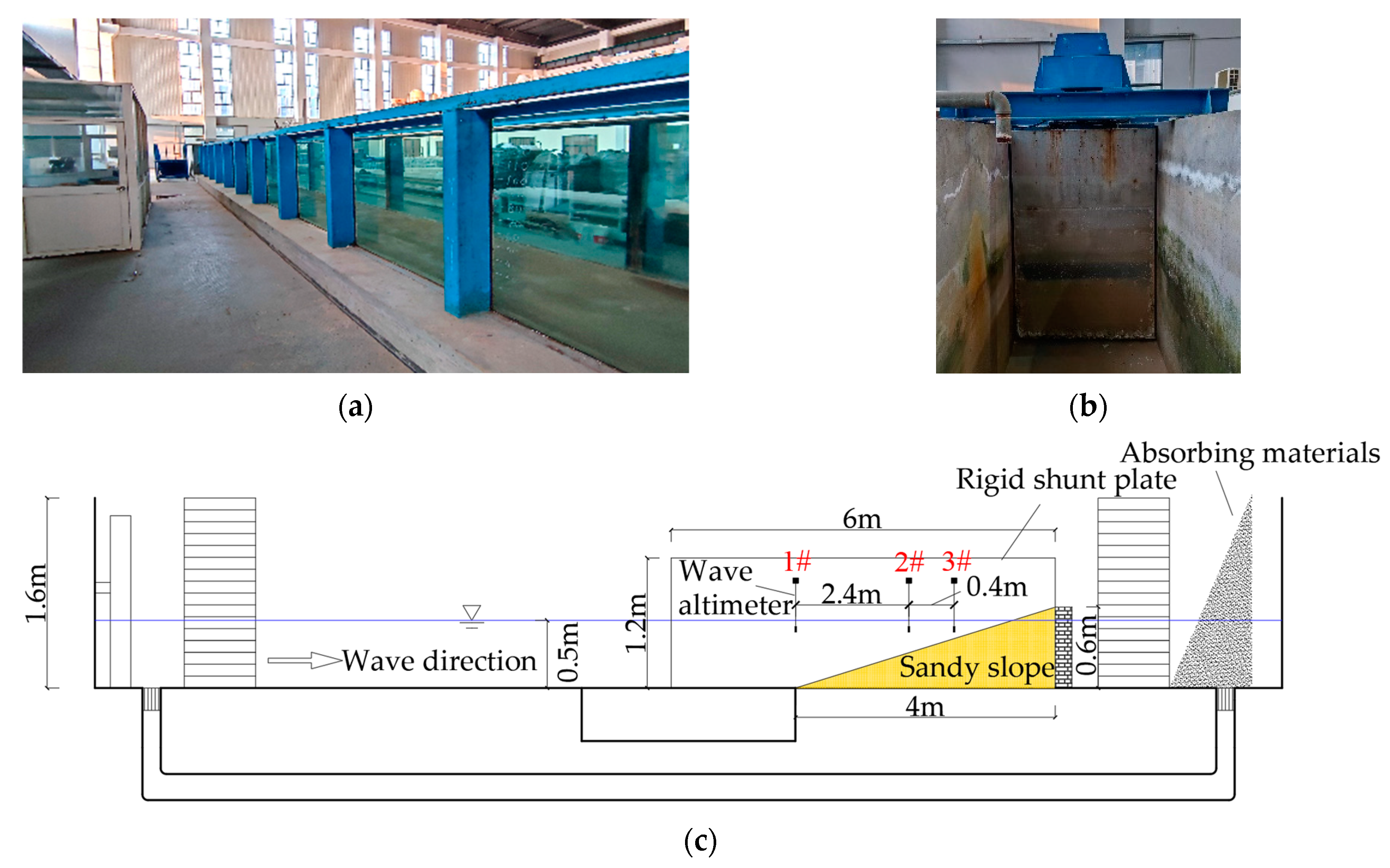
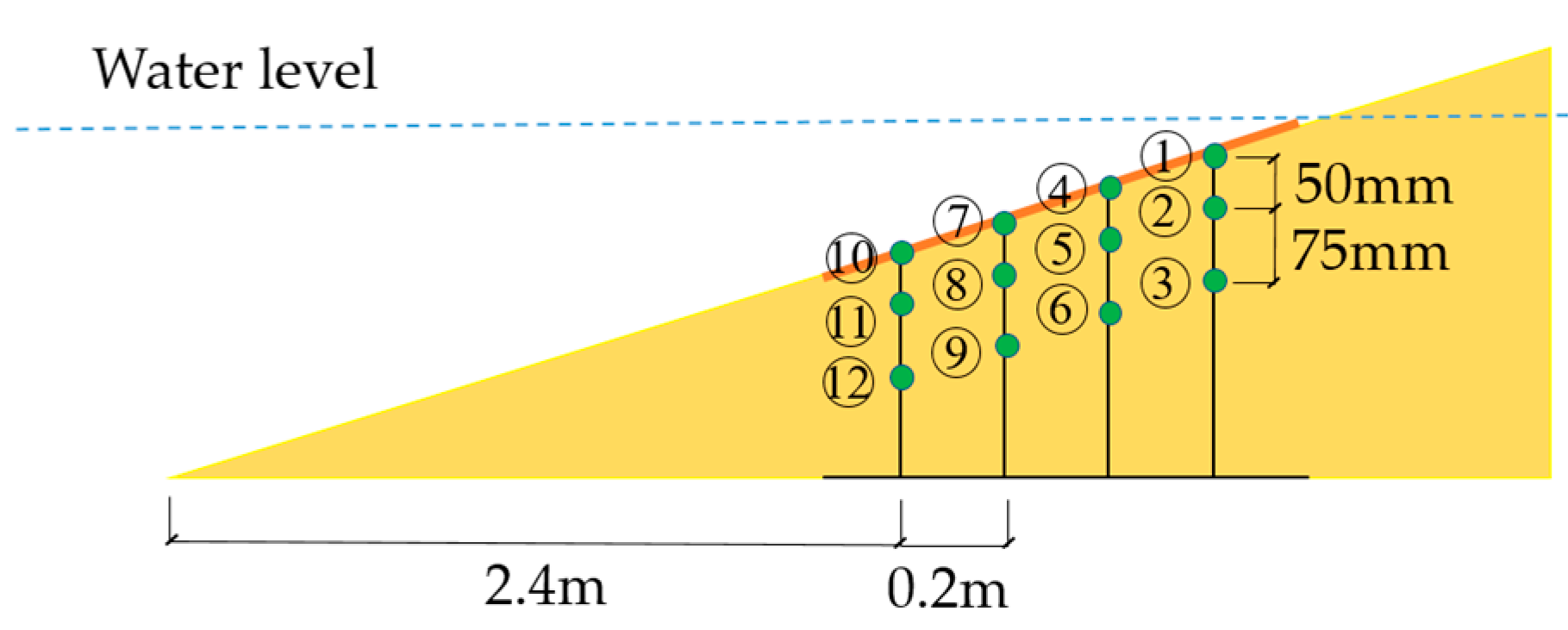
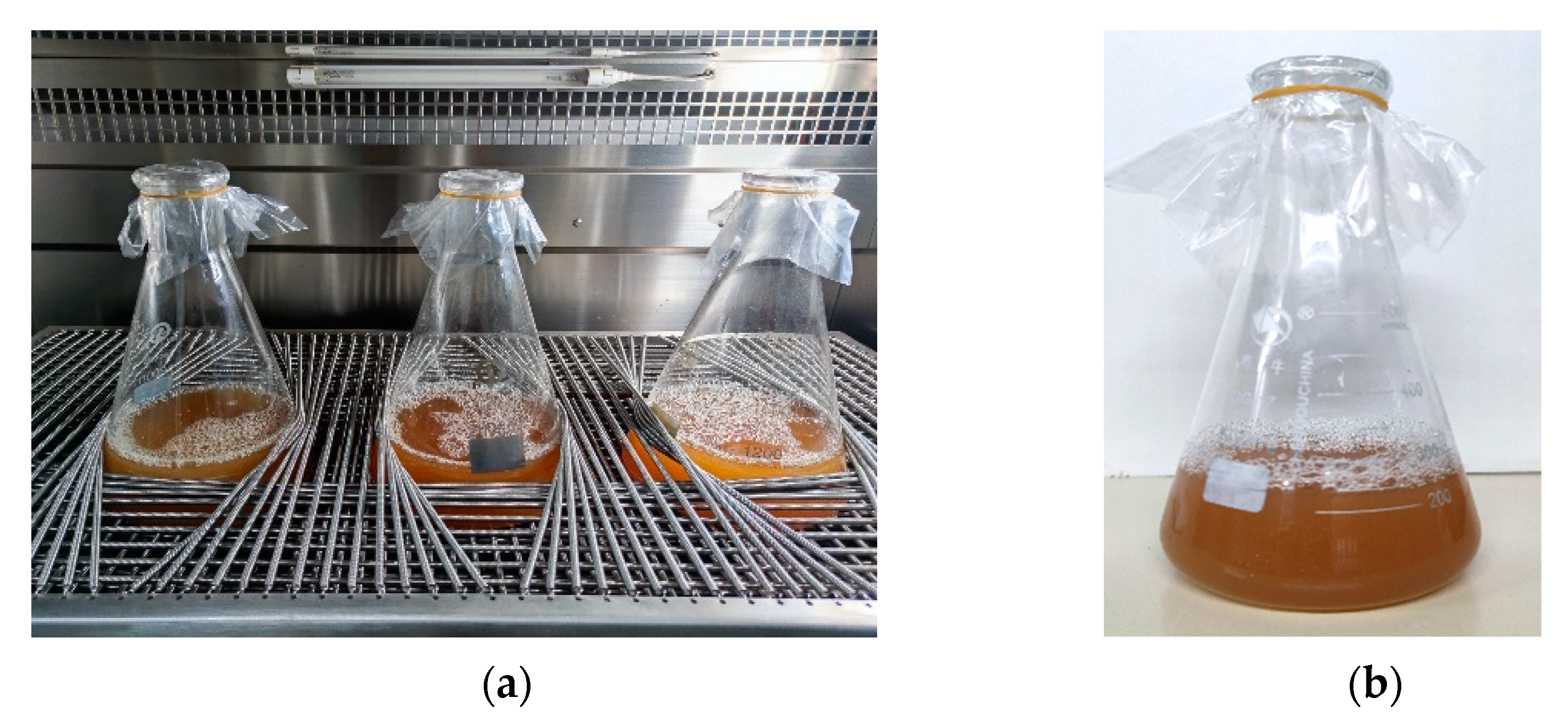
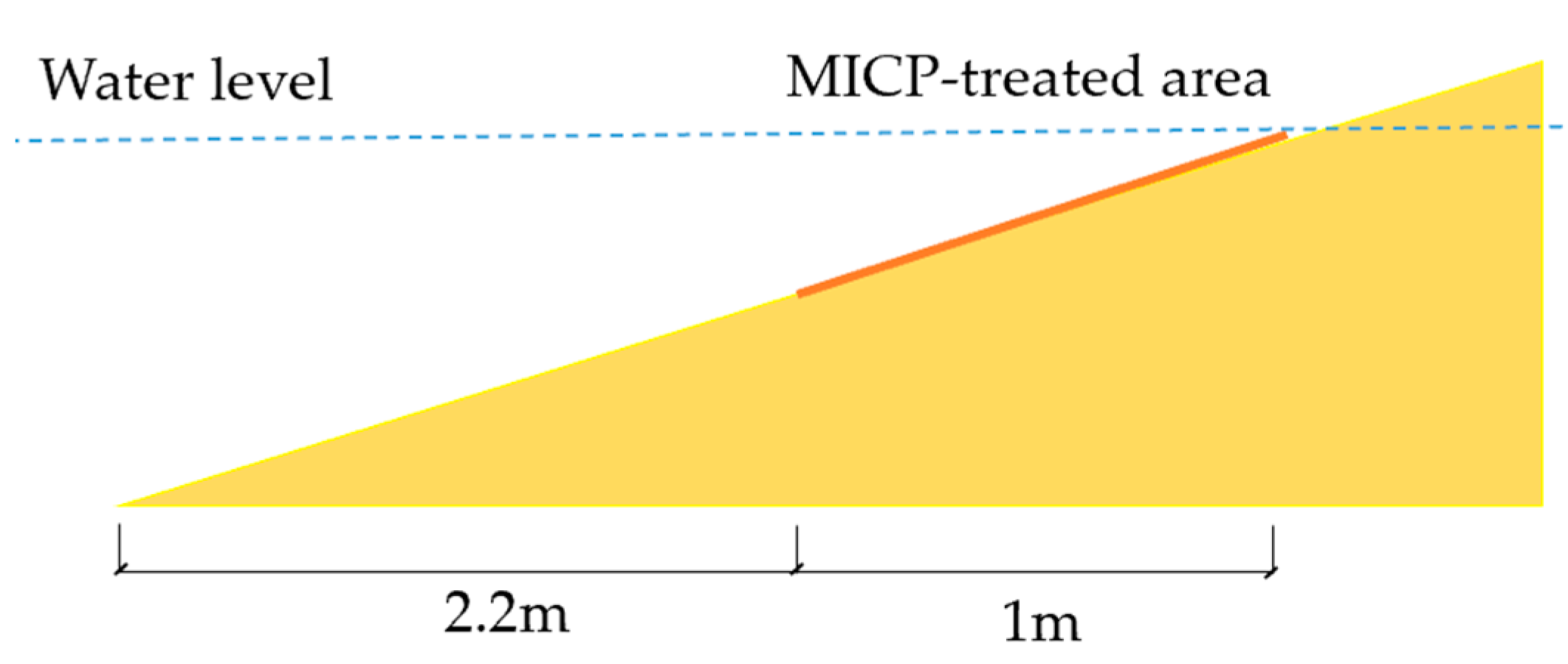
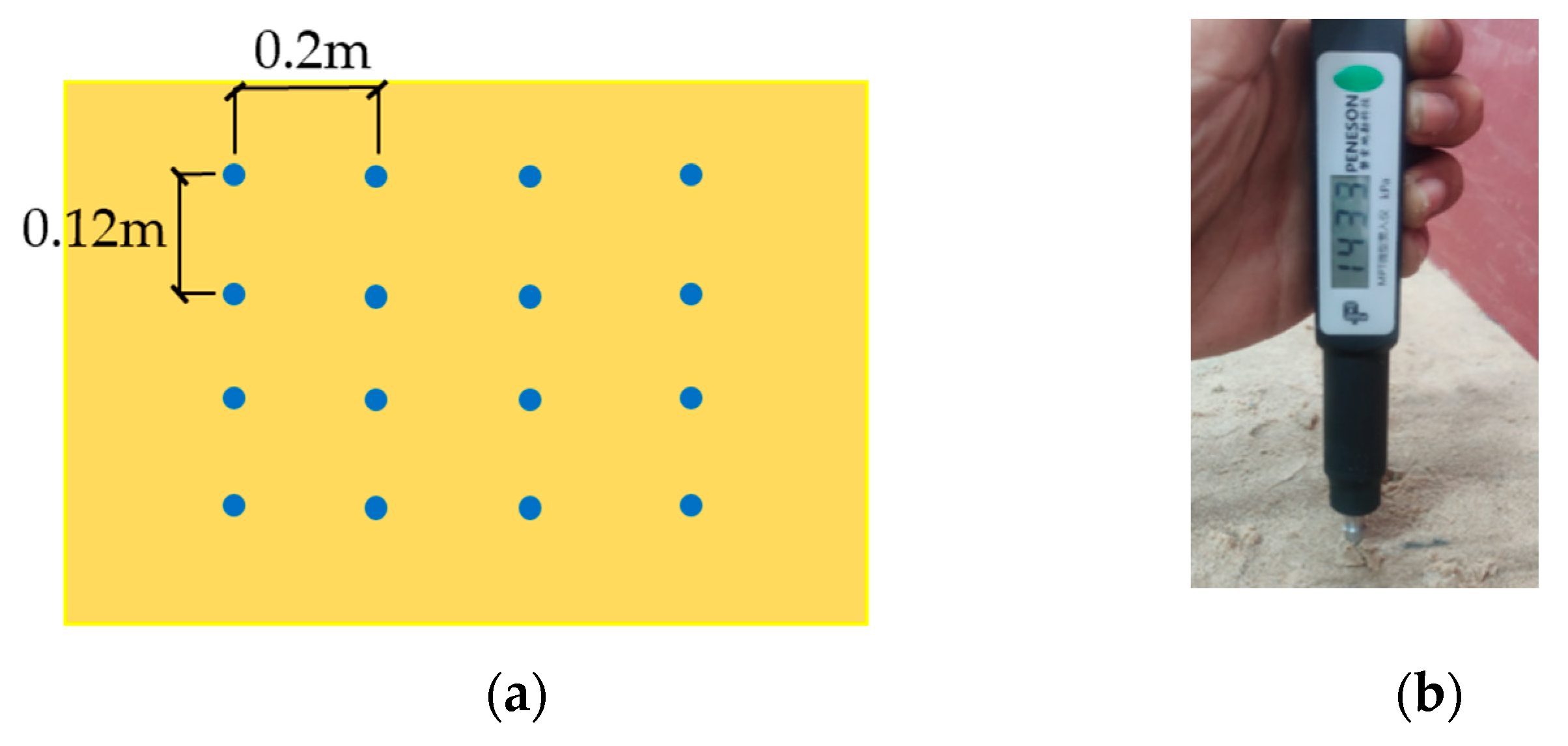

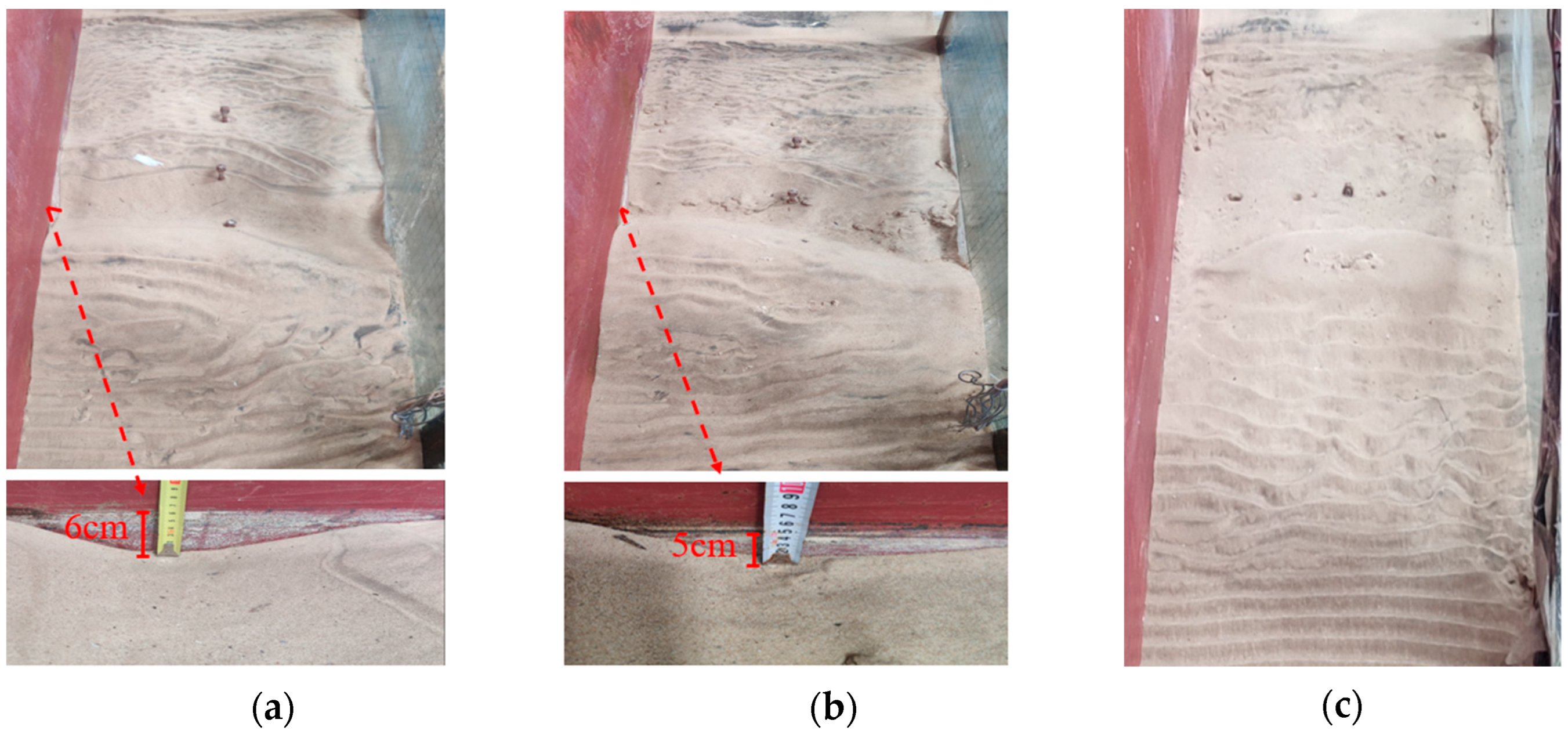

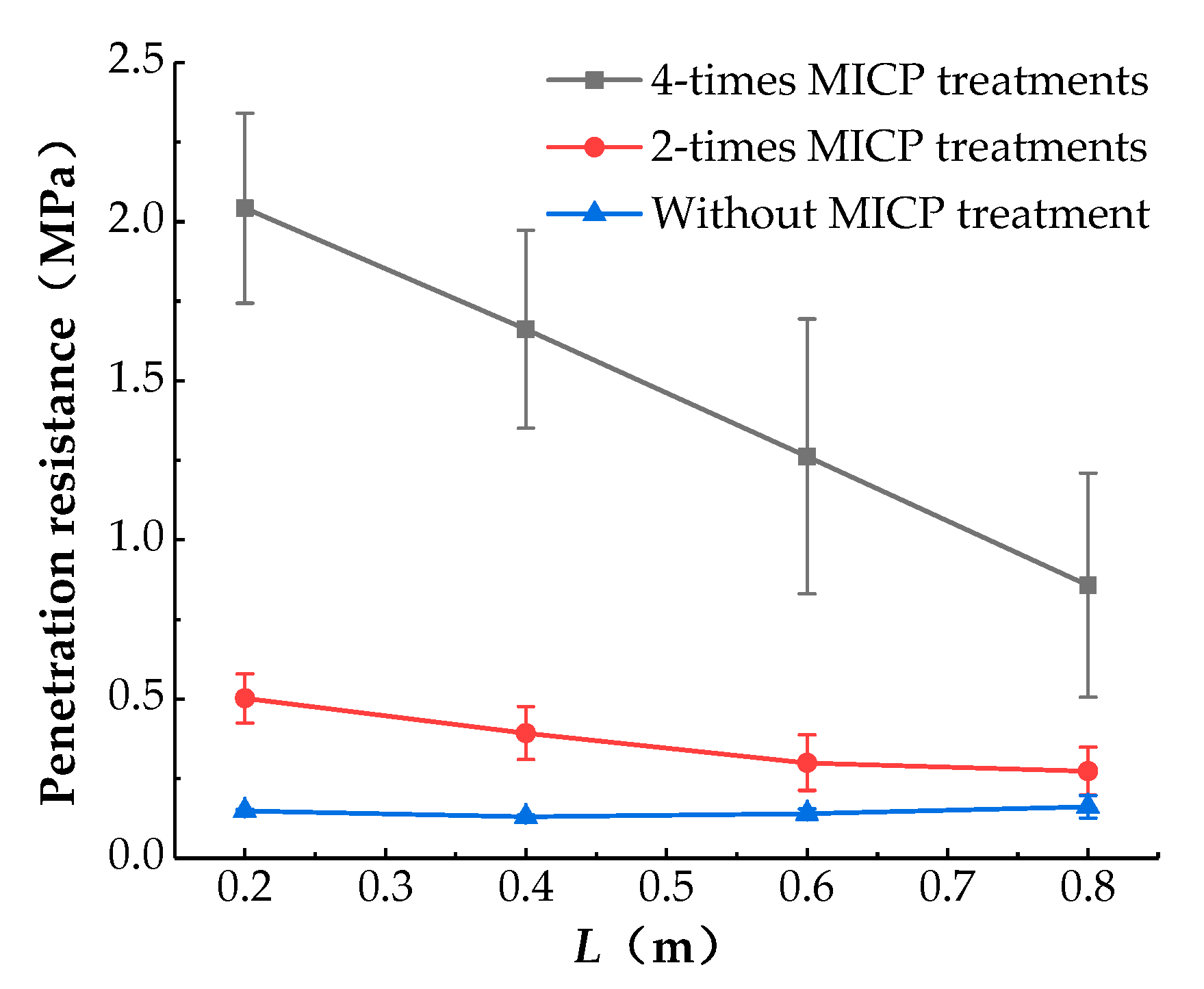
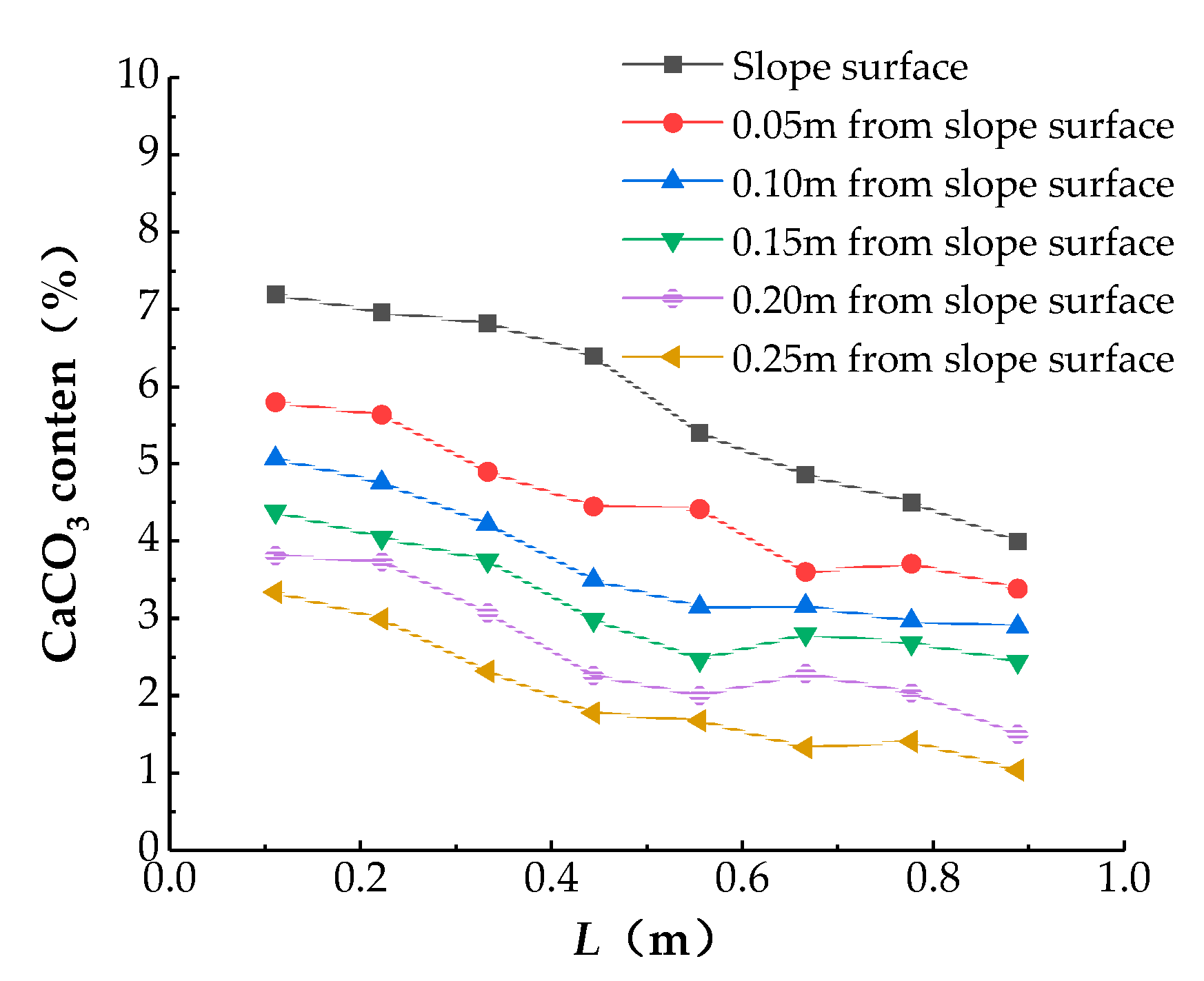
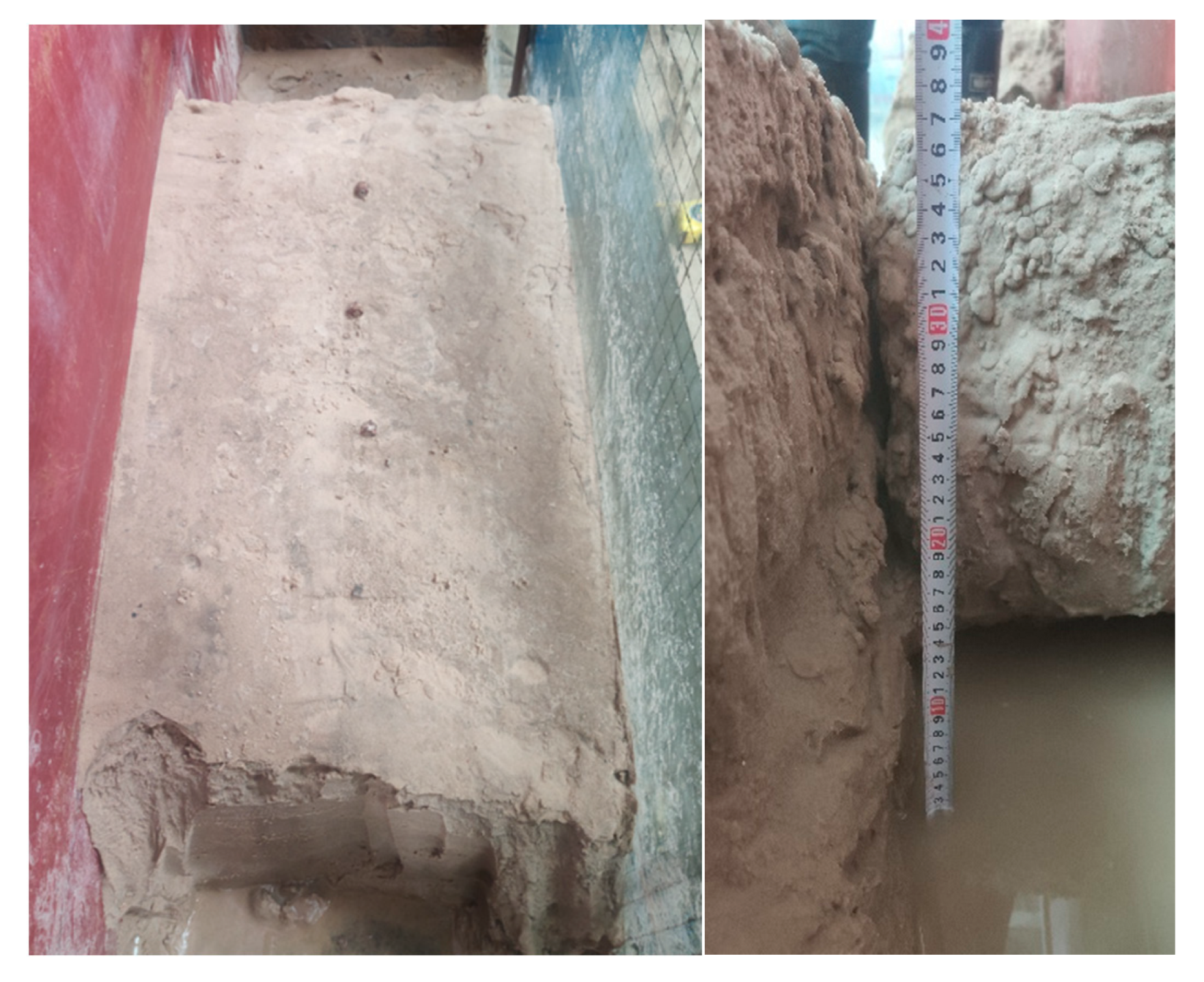
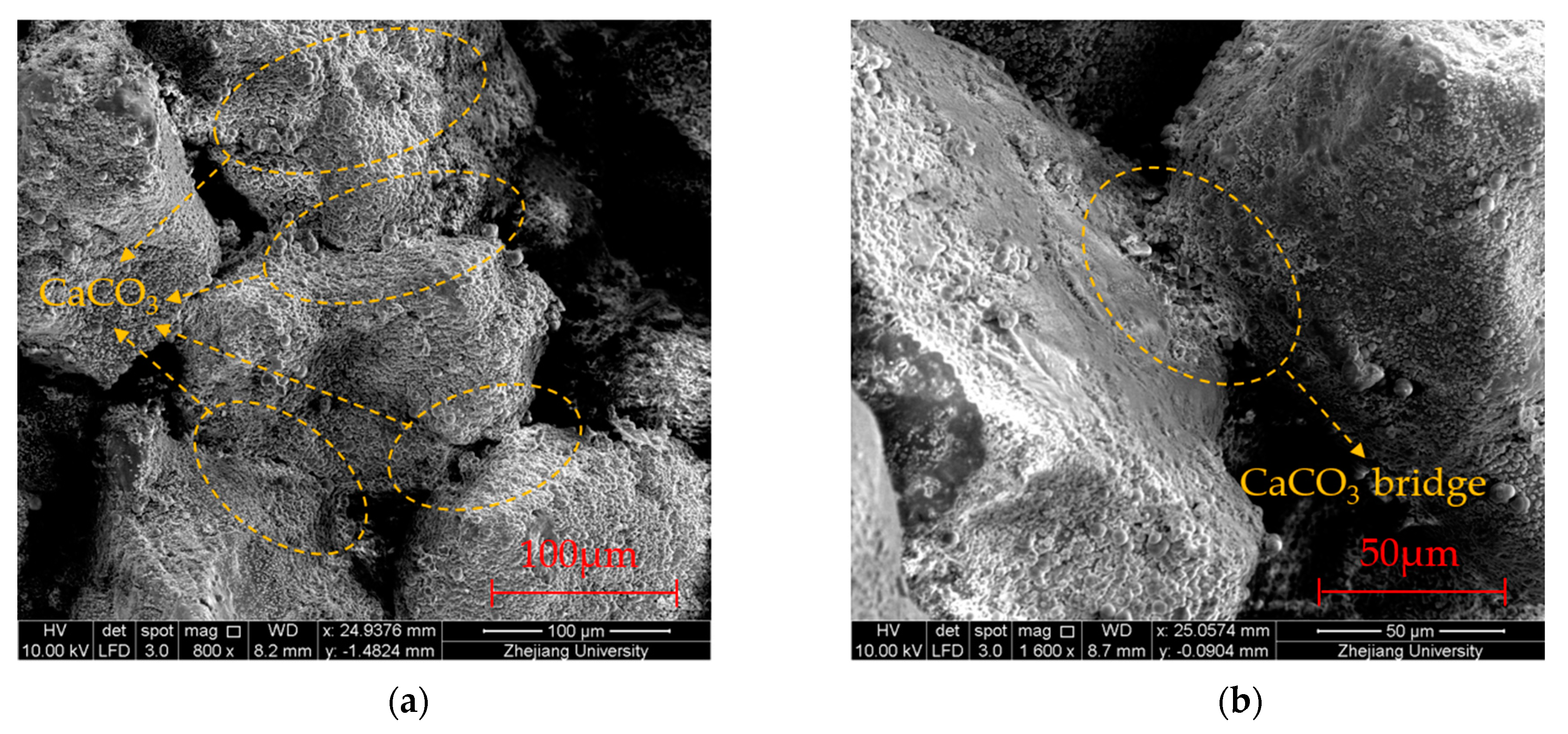
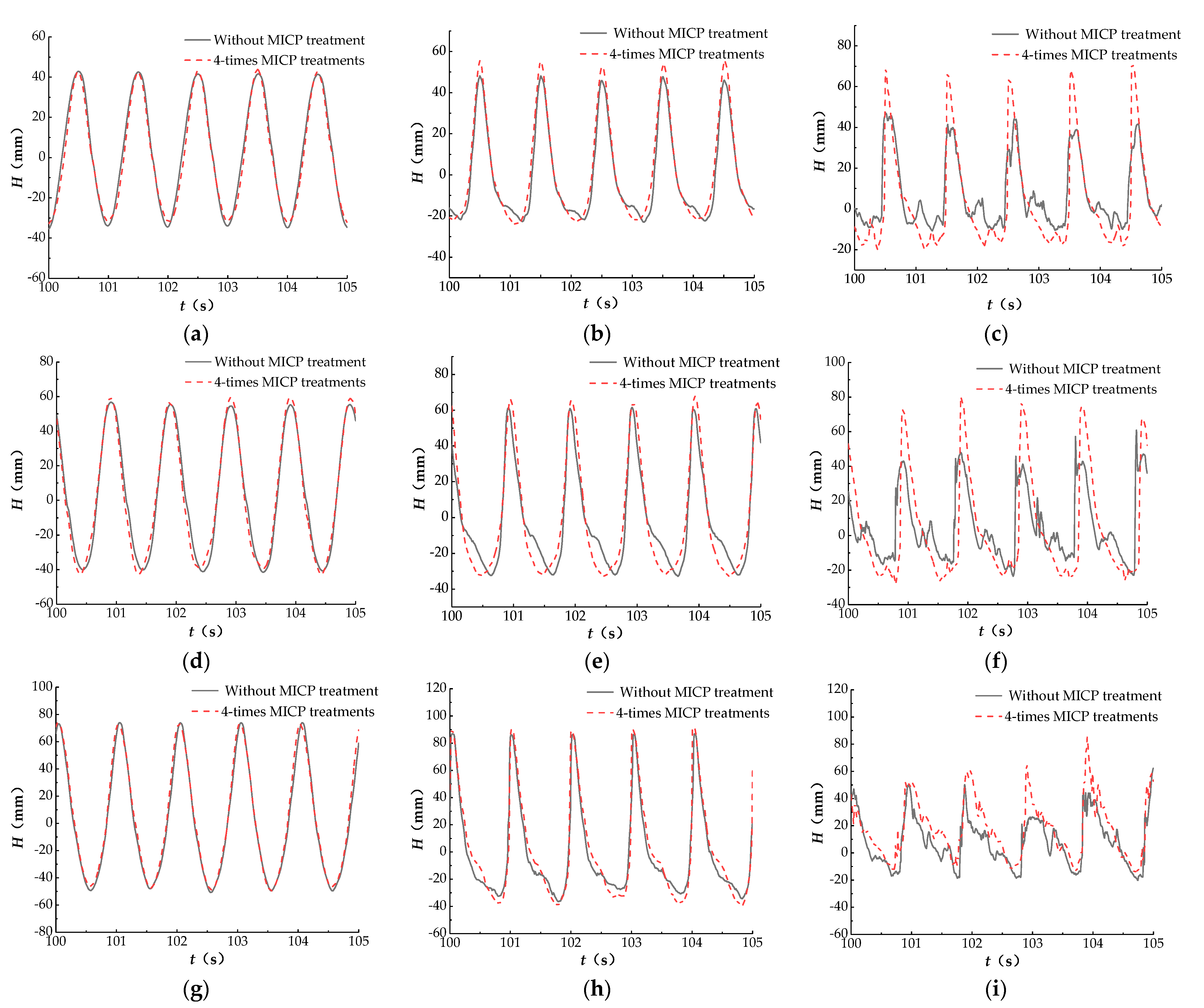

| Test Group | Wave Height (cm) | Wave Period (s) | MICP Treatment Times |
|---|---|---|---|
| 1 | 10 | 1 | 0 |
| 2 | 10 | 1 | 2 |
| 3 | 10 | 1 | 4 |
| 4 | 8 | 1 | 0 |
| 5 | 8 | 1 | 4 |
| 6 | 12 | 1 | 0 |
| 7 | 12 | 1 | 4 |
| Substance | Content (g/L) |
|---|---|
| CaCl2 | 55 |
| Urea | 60 |
| Tryptone | 10 |
| Beef extract | 3 |
Publisher’s Note: MDPI stays neutral with regard to jurisdictional claims in published maps and institutional affiliations. |
© 2022 by the authors. Licensee MDPI, Basel, Switzerland. This article is an open access article distributed under the terms and conditions of the Creative Commons Attribution (CC BY) license (https://creativecommons.org/licenses/by/4.0/).
Share and Cite
Li, Y.; Xu, Q.; Li, Y.; Li, Y.; Liu, C. Application of Microbial-Induced Calcium Carbonate Precipitation in Wave Erosion Protection of the Sandy Slope: An Experimental Study. Sustainability 2022, 14, 12965. https://doi.org/10.3390/su142012965
Li Y, Xu Q, Li Y, Li Y, Liu C. Application of Microbial-Induced Calcium Carbonate Precipitation in Wave Erosion Protection of the Sandy Slope: An Experimental Study. Sustainability. 2022; 14(20):12965. https://doi.org/10.3390/su142012965
Chicago/Turabian StyleLi, Yilong, Qiang Xu, Yujie Li, Yuanbei Li, and Cong Liu. 2022. "Application of Microbial-Induced Calcium Carbonate Precipitation in Wave Erosion Protection of the Sandy Slope: An Experimental Study" Sustainability 14, no. 20: 12965. https://doi.org/10.3390/su142012965
APA StyleLi, Y., Xu, Q., Li, Y., Li, Y., & Liu, C. (2022). Application of Microbial-Induced Calcium Carbonate Precipitation in Wave Erosion Protection of the Sandy Slope: An Experimental Study. Sustainability, 14(20), 12965. https://doi.org/10.3390/su142012965





